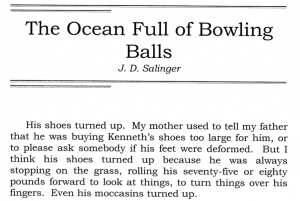we limit ourselves
without evidence
we burden ourselves
without cause
we tear apart meaning
with superficial claws
Category: Writer’s Block
Written words on everything else.
Stand By Me
#standbyme this movie. buddy holly. ben e. king. stephen king. river and kiefer. the writer as hero. friends of our youth. a dead body. castle rock. barf-a-rama on the wrong side of the tracks. leeches. train dodges and hometown blues. this movie. a movie about loss #filmsky
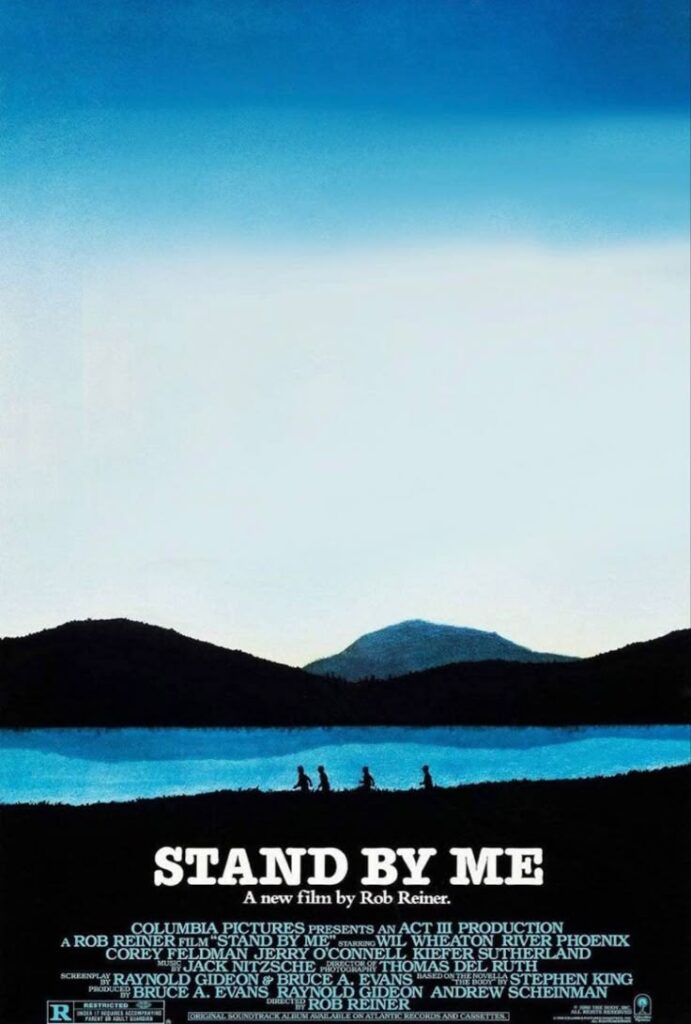
lost position
Beauty satiates
with viral fakes
As promises of late
escape while in transition
Regular relapses await
and presence abates
As caution elates
against fast submission
Withering songbird makes
Its last song relate
to tunes against hate
As love loses its position
1968: The Year the Country Broke
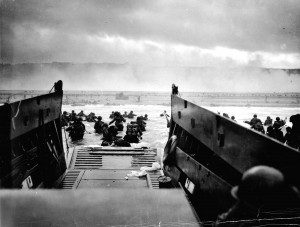 My appreciate for all things history comes naturally. I've always been drawn to stories from the past. Perhaps it stems from the tales my Granddad often shares from his World War II days. The fact that I can draw a straight line from his surviving the Battle of the Bulge to my own upbringing mystifies me to this day. Looking back at history also requires one to have an opinion. My Granddad is never shy to give his viewpoint about what was right and wrong about that war. From his admiration of Eisenhower to his disdain for Patton, he emphasized the need to go beyond simple glorification for those that called the shots and sent young men to die. For instance, he is often critical of the senseless brutality of the D-Day invasion. Too many historians take for granted the lives that were permanently disrupted in that first wave of Nazi gunfire. In doing so, my Granddad argues, they offer very little counterpoint to the operation's necessity.
My appreciate for all things history comes naturally. I've always been drawn to stories from the past. Perhaps it stems from the tales my Granddad often shares from his World War II days. The fact that I can draw a straight line from his surviving the Battle of the Bulge to my own upbringing mystifies me to this day. Looking back at history also requires one to have an opinion. My Granddad is never shy to give his viewpoint about what was right and wrong about that war. From his admiration of Eisenhower to his disdain for Patton, he emphasized the need to go beyond simple glorification for those that called the shots and sent young men to die. For instance, he is often critical of the senseless brutality of the D-Day invasion. Too many historians take for granted the lives that were permanently disrupted in that first wave of Nazi gunfire. In doing so, my Granddad argues, they offer very little counterpoint to the operation's necessity.
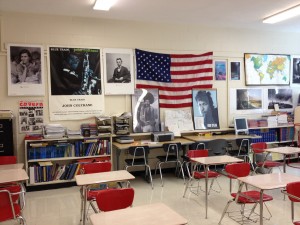 On this Martin Luther King Jr. Day, I am again thinking about history and that line I can trace backwards. As a teacher I enjoyed helping students discover the historical line that connects them to the nation's past. Unlike my Granddad, I kept my opinions out of the classroom conversation in favor of giving the students the forum to say what needed to be said. I never put bumper stickers on my car or let them know my political leanings. As a teacher, I felt it was necessary to allow students to test the waters of critical thinking without my interference. Besides I always found that, with a little prodding and devil's advocacy, students would cover all the angles when debating historical issues and events. From the timing of the Emancipation Proclamation to the dropping of the bomb on Hiroshima, my students always gave their all to prove a point.
On this Martin Luther King Jr. Day, I am again thinking about history and that line I can trace backwards. As a teacher I enjoyed helping students discover the historical line that connects them to the nation's past. Unlike my Granddad, I kept my opinions out of the classroom conversation in favor of giving the students the forum to say what needed to be said. I never put bumper stickers on my car or let them know my political leanings. As a teacher, I felt it was necessary to allow students to test the waters of critical thinking without my interference. Besides I always found that, with a little prodding and devil's advocacy, students would cover all the angles when debating historical issues and events. From the timing of the Emancipation Proclamation to the dropping of the bomb on Hiroshima, my students always gave their all to prove a point.
Only once did I break my class rule about the brokering of opinions. It came in an ad-libbed discussion of 1968. A year that opened with the Tet Offensive and the mounting failure of Vietnam. It was a year when political protests turned violent and Chicago's Democratic National Convention was cracked open with police bully clubs. The year Richard Nixon was elected by one of the thinnest margins in American history. And most importantly, 1968 was the year that brought an end to the much-needed leadership of Dr. King and Robert F. Kennedy.
Put simply, I told my students that 1968 was the most pivotal year in United States political history. It represented a fork in the line. The country could have gone in one direction but instead events on the ground forced it to choose another. I talked about what both men stood for. I talked about King's Poor People's Campaign and his discussion of issues, like Vietnam, that went beyond his advocacy for racial justice. I talked about Kennedy's platform for President. How it sought, in its own way, to mediate the impending crises that were about to rock the nation.
I am today announcing my candidacy for the presidency of the United States. I do not run for the presidency merely to oppose any man, but to propose new policies. I run because I am convinced that this country is on a perilous course and because I have such strong feelings about what must be done, and I feel that I'm obliged to do all I can." -Robert F. Kennedy
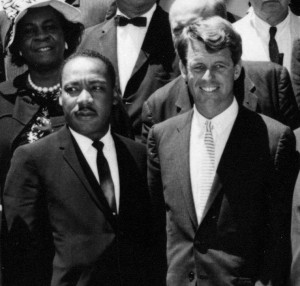 I told my students that their deaths ensured that the nation would stay on the more perilous course. A course we can all trace our current national upbringing back to. And while their martyrdom has inspired many to look beyond themselves and ask how they might be of service to the nation's greater good, their deaths represent the fact that we have lost a portion of our moral center.
I told my students that their deaths ensured that the nation would stay on the more perilous course. A course we can all trace our current national upbringing back to. And while their martyrdom has inspired many to look beyond themselves and ask how they might be of service to the nation's greater good, their deaths represent the fact that we have lost a portion of our moral center.
That moral center was firmly established in our addressing the nation's ills head on. We combatted the Great Depression by striking at the heart economic injustice. We helped preserve democracy during World War II by leading the world against tyranny. This made our nation a beacon of light for the world to see and, in turn, emulate. We then expanded on that light when our nation took up the struggle against segregation and enshrined an individual's civil and political rights into law. That light, however, became more fleeting with the deaths of Dr. King and Robert Kennedy. I told my students our country has searched for its moral center ever since. On occasion, we find it. We do the right thing. It seems, however, that center doesn't quite hold any more.
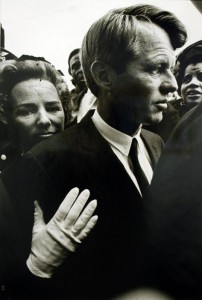 At the tail-end of my diatribe, I caught myself. I paused. I had let myself do too much of the talking. I had let my opinions flow as freely as my Granddad does during our Sunday get-togethers. I must admit it felt good.
At the tail-end of my diatribe, I caught myself. I paused. I had let myself do too much of the talking. I had let my opinions flow as freely as my Granddad does during our Sunday get-togethers. I must admit it felt good.
It was then that I decided to return the stage back to the history makers themselves. I asked my students, "Did you know Robert Kennedy delivered the eulogy at Martin Luther King's funeral?" They responded that they had not. I told them I was an admirer of the speech but that I preferred the unscripted words Kennedy spoke the night he found out about the assassination. It reveals him to be a remarkable and poetic man. I played them the YouTube clip (an amazing teacher tool) of that lonely night's remarks. My students were captivated. They saw the fleeting light I spoke of Kennedy's fatigued face, a man truly devastated by the news. They then heard the echoes of that light in his conciliatory and heart-felt words.
"What we need in the United States is not division; what we need in the United States is not hatred; what we need in the United States is not violence or lawlessness, but love and wisdom, and compassion toward one another, and a feeling of justice towards those who still suffer within our country, whether they be white or whether they be black" - Robert F. Kennedy
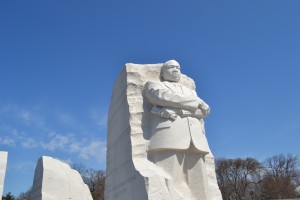 On this day of Martin Luther King remembrance I choose to trace myself back to that moment in 1968. The moment encapsulated by those words. They serve as a challenge to us all to remember that we need not be divided. A reminder that we can rediscover our moral center by working together. By loving one another. It may seem fleeting at times, but we can still connect with others despite our perceived differences. It is the hallmark of union. Jefferson, Lincoln, King, Kennedy (and many others) improved this country by focusing on the promise of togetherness and equality. We can, too. All one has to do is trace the historical line backwards that connects them to the men and women that populate the past. We should all be inspired by the progress that they have made on our behalf. With inspiration as our guide, we should in turn add our own contribution to the national timeline, helping it move forward as we on occasion look back.
On this day of Martin Luther King remembrance I choose to trace myself back to that moment in 1968. The moment encapsulated by those words. They serve as a challenge to us all to remember that we need not be divided. A reminder that we can rediscover our moral center by working together. By loving one another. It may seem fleeting at times, but we can still connect with others despite our perceived differences. It is the hallmark of union. Jefferson, Lincoln, King, Kennedy (and many others) improved this country by focusing on the promise of togetherness and equality. We can, too. All one has to do is trace the historical line backwards that connects them to the men and women that populate the past. We should all be inspired by the progress that they have made on our behalf. With inspiration as our guide, we should in turn add our own contribution to the national timeline, helping it move forward as we on occasion look back.
The Internet and J.D. Salinger
This morning I awoke to news that three J.D Salinger stories were leaked online. Within three minutes I was able to find a torrent link and download a copy for myself. Surely, Mr. Salinger never anticipated the power of the Internet to undermine his publishing wishes. I felt strangely at odds with myself over the download. On one hand I wanted to respect the wishes of the revered author. Despite myself, I also wanted to read something new from the man whose writing had considerable influence over my teenage years. With Black Friday being the ultimate impulse shopping day, I relented and secured a copy.
I look forward to reading the works once my baby-boy settles down for a nap. I am a bit weary, however, given the fact that so little is published by Salinger. For this reason, the reading does risk disappointment. I had a very similar feeling when Nirvana released "You Know You're Right." Fortunately, the posthumously released single did not disappoint.
Too often the Internet's commenting class ruin these type of releases because they overly criticize, judge and rehash the past. Check out the YouTube comments that go with the Nirvana link above for proof of this trend. In actuality, it's just a song. It's just a story. I think J.D. Salinger's Buddhist sensibilities would appreciate this approach. For this reason I will let you all decide if the works are worth reading. There is, however, reason for intrigue. According to the Guardian Newspaper:
The stories include An Ocean Full of Bowling Balls, which has only been available under lock and key to scholars at Princeton library.
The tale is an early version, originally written for Harper's Bazaar magazine but withdrawn before publication, of The Catcher in the Rye. The narrator is the older brother of Holden Caulfield, the teenage narrator of the later book.
The other stories, entitled Paula, and Birthday Boy, were held by the University of Texas under similar conditions.
Enjoy.
Best Block: JD Salinger's unpublished stories leaked online (Maev Kennedy)

